
Reflect on these Questions
- What does self-acceptance mean to you?
- How do you currently feel about yourself and your identity?
- Can you recall a time when you felt truly at peace with who you are?
- What aspects of yourself do you find challenging to accept?
- How has your cultural background influenced your self-perception?
- Are there traits or qualities you appreciate about yourself?
In a world often filled with external expectations and societal pressures, the idea of embracing ourselves, flaws and all, becomes ridiculously challenging.
Through this process, we'll not only rediscover our innate humanity but also cultivate a profound sense of inner peace and resilience in the face of life's challenges.
Accepting yourself is a gradual and ongoing process that involves self-reflection, self-compassion, and a commitment to personal growth.
What is the meaning of self-acceptance?
Self-acceptance is the process of embracing and acknowledging oneself with all its strengths, weaknesses, and unique qualities. It involves recognizing and embracing both positive and negative aspects of one's identity, abilities, and experiences without judgment or self-criticism.
Embracing who you are, with all your strengths and imperfections, is a transformative endeavor that can lead you to a more fulfilling and authentic personality.
In essence, self-acceptance is a return to our roots, a journey back to the unblemished acceptance we embodied as infants. It's a conscious effort to peel away the layers imposed by society and experiences, allowing our true selves to shine through.
Acceptance is divided into three categories which are self-acceptance all about accepting yourself, which we'll break down right here, acceptance of others, people around you basically , and accepting the world.
Self-acceptance
This is the cornerstone of personal well-being. Self-acceptance involves acknowledging and embracing all aspects of oneself—strengths, weaknesses, successes, and failures. It goes beyond recognizing the physical self to encompass one's emotions, thoughts, and unique qualities. Cultivating self-acceptance involves being kind to oneself, practicing self-compassion, and understanding that personal growth is a continuous journey.
Accepting of others
Just as we seek acceptance for ourselves, fostering an accepting attitude towards those around us is crucial for healthy relationships. Accepting others involves recognizing and respecting their individuality, understanding that everyone has their own journey and experiences. It's about embracing diversity, appreciating differences, and allowing people to be themselves without judgment. This form of acceptance is fundamental for building meaningful connections and nurturing a supportive community.
Acceptance of the World
Beyond our immediate social circles, accepting the world involves coming to terms with the external environment—both the natural world and the broader societal context. It includes acknowledging the unpredictability of life, understanding the interconnectedness of all living things, and recognizing that change is a constant. Accepting the world requires a certain level of adaptability, mindfulness, and a willingness to engage with the world with an open heart and mind.
How do you gain self-acceptance?
Accepting yourself is a gradual and ongoing process that involves self-reflection, self-compassion, and a commitment to personal growth.
Here are some steps you can take to gain and foster self-acceptance:
Self-Reflection
Take time to reflect on your feelings and identify the specific aspects of yourself that you struggle to accept.
Consider the expectations and dreams that may contribute to your lack of self-acceptance.
Practice Self-Compassion
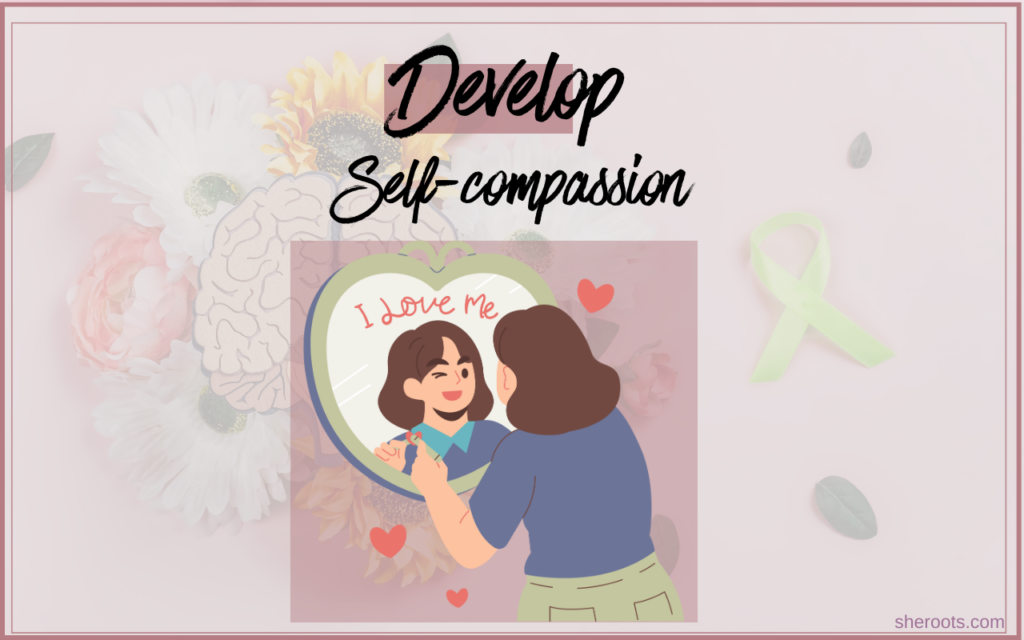
Treat yourself with the same kindness and understanding that you would offer to a friend facing challenges. Be gentle with yourself, especially during difficult times. Acknowledge that everyone makes mistakes and encounters setbacks.
Throughout this journey, you may encounter doubts, but know that you're not alone. We all face our inner struggles. The key is to approach yourself with the same compassion you extend to others. Your worth is not determined by external validations; it comes from within.
Develop a Positive Self-Image
Challenge societal or external standards of beauty and success. Define your own values and priorities. Cultivate a positive self-image based on your unique qualities, strengths, and values.
Set Realistic Expectations
Reevaluate your expectations, both of yourself and others. Are they realistic and achievable? Adjust them if necessary.
Focus on the process and effort rather than solely on the outcomes.
Be realistic about the time you have available for a particular task or goal. Avoid overcommitting yourself and recognize that some objectives may take longer than others.
Recognize your personal strengths and limitations. Setting expectations that are in line with your capabilities helps prevent unnecessary stress and disappointment.
- Life is unpredictable, and circumstances may change. Allow room for flexibility in your expectations and be willing to adapt your goals as needed.
- Divide larger goals into smaller, more manageable tasks. This makes the overall objective seem less overwhelming and allows for a sense of accomplishment along the way.
- Regularly seek feedback from yourself and others. Assess your progress and adjust your expectations based on the feedback you receive.
- Understand that people have their own strengths, weaknesses, and limitations. Set realistic expectations in relationships, recognizing that no one is perfect.
Challenge Negative Thoughts
Pay attention to negative self-talk and challenge those critical thoughts. Ask yourself if these thoughts are based on facts or if they are distorted perceptions. Replace negative thoughts with more balanced and positive affirmations.
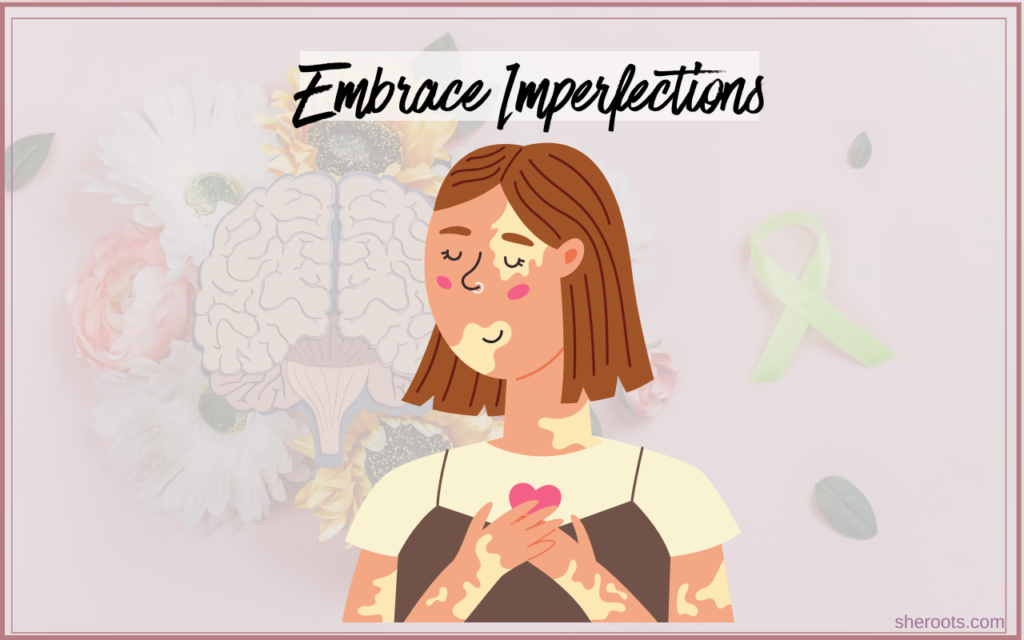
Embrace Imperfections
Recognize that nobody is perfect. Embrace your imperfections and understand that they are a natural part of being human. Perfection is an unrealistic standard, and accepting your flaws can lead to greater self-compassion.
Embracing yourself doesn't mean striving for perfection, but rather celebrating the beautiful messiness of being human.
Explore the beauty in imperfection, the strength in vulnerability, and the empowerment that arises from embracing your authentic self.
Remember, self-acceptance is not about striving for an unattainable perfection; it's about acknowledging your uniqueness, celebrating your victories, and learning from your challenges. It's a commitment to treating yourself with kindness, even in moments of difficulty.
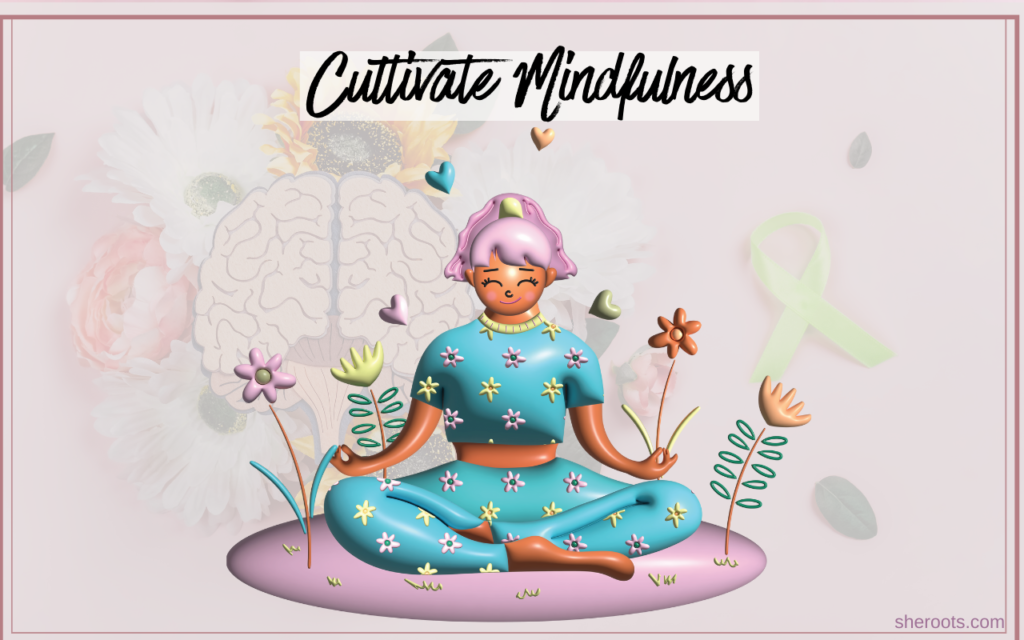
Cultivate Mindfulness
Practice mindfulness to stay present in the moment and observe your thoughts without judgment. Mindfulness can help you become more aware of your emotions and reactions, creating space for acceptance.
Learn from Mistakes
Instead of dwelling on mistakes, view them as opportunities for growth and learning. Understand that making mistakes is a natural part of life, and they do not define your worth as a person.
Consider this an invitation to explore the concept of self-acceptance, not as an end goal but as a continuous process. Life unfolds in unpredictable ways, and within those twists and turns lies the opportunity to understand and appreciate yourself on a deeper level.

Forgiveness for Mistakes
Forgive yourself for past mistakes or perceived failures. Understand that making mistakes is a part of the human experience and an opportunity for growth.
Extend to yourself the compassion and understanding you readily offer to others. Understand that you, too, are deserving of forgiveness and kindness.
Guilt can be a heavy burden. Allow yourself to release it, understanding that dwelling on past actions can hinder your ability to move forward.
Focus on Self-Care
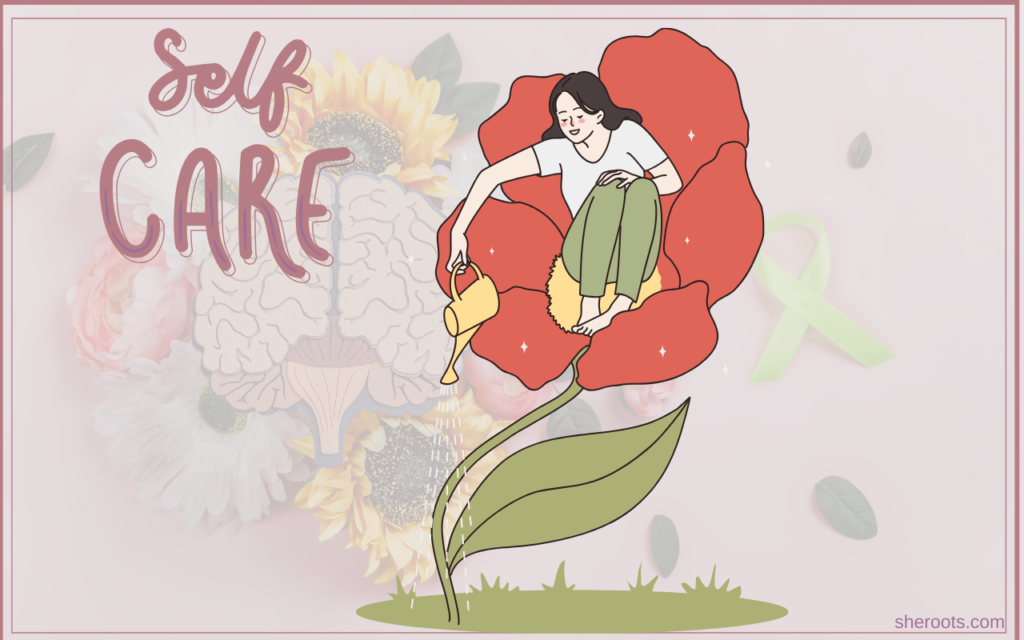
Prioritize self-care activities that promote physical, emotional, and mental well-being. Taking care of yourself contributes to a positive self-image and reinforces the importance of self-acceptance.
What causes lack of self-acceptance?
The lack of self-acceptance can be influenced by various factors, and it often results from a combination of internal and external dynamics.
Here are some factors which often contribute to the lack of self-acceptance.
- Cultural and social standards can create unrealistic expectations about beauty, success, and behavior. These social expectations can create an unattainable standard, leaving us feeling inadequate when we perceive ourselves falling short.
- Constantly comparing ourselves to others can lead to feelings of inadequacy. In an era of social media, where curated images often dominate, comparisons can be particularly pervasive. In today's world where achievements are often showcased, this comparison can fuel a sense of unworthiness and erode our self-acceptance.
- Our early experiences, especially in childhood, play a significant role. Messages from caregivers, peers, and society can shape our self-image, laying the foundation for self-acceptance or its absence.
- The fear of being judged or rejected can lead us to mask our authentic selves. This fear often stems from a desire for external approval, hindering our ability to embrace who we truly are.
- Setting unrealistically high standards for ourselves can set the stage for perpetual self-criticism. Striving for perfection rather than embracing imperfection can create an internal environment devoid of self-acceptance.
- Negative Self-Talk, The words we speak to ourselves matter. Negative self-talk, a relentless inner critic, can drown out the gentle whispers of self-acceptance, fostering doubt and insecurity.
- Unresolved past traumas can cast long shadows on our self-perception. These wounds may manifest as self-doubt, making it challenging to fully accept and love ourselves.
- Lack of Self-Compassion, The ability to be kind to ourselves, especially in moments of difficulty, is fundamental to self-acceptance. Without self-compassion, we may find it challenging to weather the storms of life with grace and acceptance.
Why self-acceptance is so powerful?
Self-acceptance is a powerful force that positively impacts various aspects of life, including mental and emotional well-being, relationships, confidence, stress management, personal growth, authenticity, and even physical health. Embracing oneself with kindness and understanding can lead to a more fulfilling and resilient life.
- Accepting oneself leads to increased mental and emotional well-being. It allows individuals to navigate life with a positive attitude, resilience, and a sense of inner peace. When you accept yourself, you are better equipped to handle challenges and setbacks.
- Self-acceptance positively influences how you relate to others. When you are comfortable with who you are, you are more likely to form genuine connections with others. Accepting your flaws and imperfections makes you more understanding and accepting of the differences in others.
- Embracing oneself fosters a sense of confidence. Instead of constantly seeking external validation, individuals who practice self-acceptance are more likely to trust their abilities and decisions, leading to greater self-confidence.
- Self-acceptance reduces the internal conflict and stress that can arise from self-criticism and negative self-talk. When you accept yourself, you are less likely to engage in harmful comparison with others, thereby lowering anxiety levels.
- Accepting yourself doesn't mean settling for where you are; it means acknowledging your current state while being open to growth. This self-awareness becomes a foundation for personal development, as you can build on your strengths and work on areas that may need improvement without harsh self-judgment.
- Self-acceptance contributes to resilience by fostering a positive mindset. When faced with difficulties, individuals who accept themselves are more likely to view challenges as opportunities for growth rather than insurmountable obstacles.
- Self-acceptance allows you to live authentically, being true to who you are. This authenticity attracts like-minded individuals and creates a sense of fulfillment as you align your actions with your values and beliefs.
- There is evidence to suggest that self-acceptance may have positive effects on physical health. Reduced stress and a positive mindset are associated with lower levels of certain health risks.
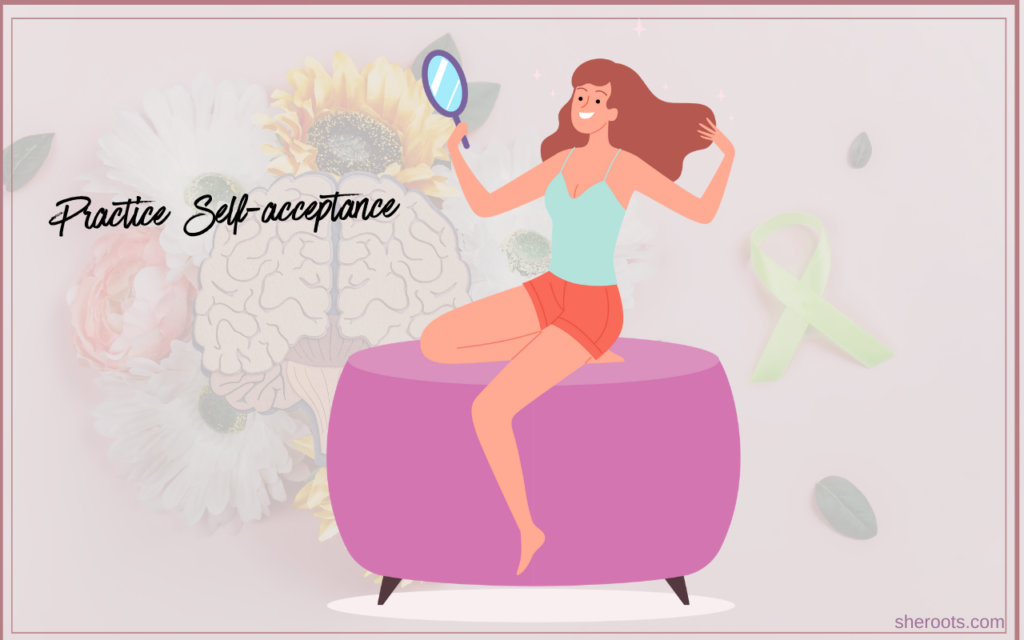
Self-acceptance Exercises
Here are some specific examples of self-acceptance exercises:
- Mirror Affirmations:
- Stand in front of a mirror and focus on positive aspects of your appearance.
- Say out loud affirmations like "I am beautiful just as I am" or "I appreciate my unique features."
- Strengths Journal:
- Keep a journal dedicated to your strengths and achievements.
- Write about instances where you demonstrated resilience, creativity, kindness, or any other positive qualities.
- Three Good Things:
- Every evening, write down three positive things about your day.
- Include personal accomplishments, positive interactions, or moments of self-compassion.
- Body Gratitude Ritual:
- Take a few minutes daily to express gratitude for different parts of your body.
- Focus on functionality and express appreciation for what your body allows you to do.
- Self-Compassion Break:
- When faced with a challenge, practice the self-compassion break:
- Acknowledge the difficulty: "This is a tough moment."
- Connect with common humanity: "Others have faced similar challenges."
- Offer yourself kindness: "May I be kind to myself in this moment."
- When faced with a challenge, practice the self-compassion break:
- Mindful Eating:
- Engage in mindful eating by paying attention to the tastes, textures, and smells of your food.
- Practice self-acceptance by letting go of judgment about what you eat.
- Letter of Forgiveness:
- Write a letter to yourself forgiving any perceived shortcomings or mistakes.
- Be compassionate and understanding, recognizing that everyone makes errors.
- Goal Setting with Compassion:
- Set realistic and achievable goals for personal growth.
- Frame goals in a positive light, focusing on what you want to gain rather than what you want to avoid.
- Positive Visualization:
- Close your eyes and visualize a scenario where you feel completely accepted and at peace with yourself.
- Engage all your senses to make the visualization vivid and positive.
- Digital Detox:
- Take a break from social media if it contributes to negative self-comparisons.
- Use that time for self-reflection and engaging in activities that bring you joy.
- Daily Gratitude Jar:
- Keep a jar and write down one thing you're grateful for each day.
- Review these notes when you need a reminder of the positive aspects of your life.
- Affirmation Cards:
- Create small affirmation cards with positive messages.
- Carry them with you and pull one out when you need a boost of self-acceptance.
Remember, the key is consistency. Incorporate these exercises into your routine gradually, and tailor them to suit your preferences and comfort level. The goal is to foster a positive and accepting relationship with yourself over time.




2 comments